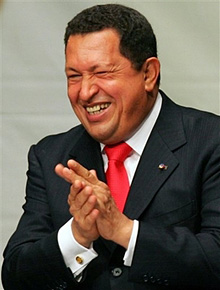 |
 |
 |
 News from Around the Americas | January 2007 News from Around the Americas | January 2007  
Chavez Moves Venezuela Toward Socialism
 Jorge Rueda - Associated Press Jorge Rueda - Associated Press


| | Venezuela's President Hugo Chavez laughs at the swearing ceremony of new ministers in Caracas, Monday, Jan. 8, 2007. Chavez called the chief of the Organization of American States, OEA, Jose Miguel Insulza, an 'idiot' and urged him to resign. (AP/Leslie Mazoch) |
As Venezuela embarked on another six years under Hugo Chavez, the president announced plans to nationalize power and telecommunications companies and make other bold changes to increase state control as he promised a more radical push toward socialism.

Chavez, who will be sworn in Wednesday to a third term that runs until 2013, also said he wanted a constitutional amendment to strip the Central Bank of its autonomy and would soon ask the National Assembly, solidly controlled by his allies, to approve "a set of revolutionary laws" by presidential decree.

"We're moving toward a socialist republic of Venezuela, and that requires a deep reform of our national constitution," Chavez said in a televised address after swearing in his new Cabinet on Monday. "We're heading toward socialism, and nothing and no one can prevent it."

The changes are in keeping with pledges he made after his re-election last month to take a more radical turn toward socialism. His critics have voiced concern that he would use his sweeping victory to tighten his grip on power, following in the footsteps of Fidel Castro.

Cuba, one of Chavez's closest allies in the region, nationalized major industries shortly after Castro came to power in 1959. Bolivia's Evo Morales, another Chavez ally, moved to nationalize key sectors after taking office last year.

"The nation should recover its ownership of strategic sectors," Chavez said. "All of that which was privatized, let it be nationalized," he added, referring to "all of those sectors in an area so important and strategic for all of us as is electricity."

Chavez, first elected in 1998, has progressively moved to remake Venezuelan society, rewriting laws, setting up state-funded cooperatives and starting a land reform program that has turned over large swaths of ranch lands to poor farmers. Chavez calls it his Bolivarian Revolution, named after South American independence hero Simon Bolivar.

"The eight-year transition phase is ending and we're entering a new era — the Simon Bolivar national plan, Bolivarian socialism," Chavez told his audience of cheering supporters.

The nationalization appeared likely to affect Electricidad de Caracas, owned by Arlington, Virginia-based AES Corp., and C.A. Nacional Telefonos de Venezuela, known as CANTV, the country's largest publicly traded company and the only Venezuelan listing on the New York Stock Exchange. Verizon Communications Inc. has a 28.5 percent interest in CANTV.

Chavez said lucrative oil projects in the Orinoco River basin involving foreign oil companies should be under national ownership. He did not spell out whether foreign investors would be compensated or simply expropriated.

Political analyst Gloria Cuenca said the Monday's announcement was a glimpse of the next six years.

"It seems he has decided to stoke the fire to deepen his revolution, which from my point of view aims to look a lot like Castro's Cuba," said Cuenca, a communication professor at Venezuela's Central University.

Chavez cited the communist ideals of Karl Marx and Vladimir Lenin at other points in his speech.

The nation's newspapers carried news of the announcements in banner headlines, and El Nacional, which is sharply critical of Chavez, said in an editorial that the president "surprised all Venezuelans" with his moves. The paper said there is a clear need for a national debate on the seizing of private companies.

Chavez said that lucrative oil projects in the Orinoco River basin involving foreign oil companies should be under national ownership. He didn't spell out whether that meant a complete nationalization, but said any vestiges of private control over the energy sector should be undone.

Chavez did not appear to rule out all private investment in the oil sector. Since last year, his government has sought to form state-controlled "mixed companies" with British Petroleum PLC, Exxon Mobil Corp., Chevron Corp., ConocoPhillips Co., Total SA and Statoil ASA to upgrade heavy crude in the Orinoco. Such joint ventures have already been formed in other parts of the country. | 
 | |
 |



